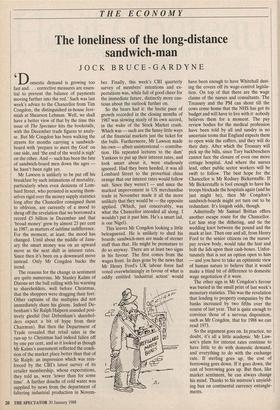THE ECONOMY
The loneliness of the long-distance sandwich-man
JOCK BRUCE-GARDYNE
Mr Lawson is unlikely to be put off his breakfast by such intimations of mortality, particularly when even denizens of Lom- bard Street, who persisted in scaring them- selves rigid over the money supply statistics long after the Chancellor consigned them to oblivion, are currently of a mood to shrug off the revelation that we borrowed a record £5 billion in December and that 'broad money' grew by almost 23 per cent in 1987, as matters of sublime indifference. For the moment, at least, the mood has changed. Until about the middle of Janu- ary the smart money was on an upward move as the next shift in interest rates. Since then it's been on a downward move instead. Only Mr Congdon bucks the trend.
The reasons for the change in sentiment are quite numerous. Mr Stanley Kalms of Dixons set the ball rolling with his warning to shareholders, well before Christmas, that the shoppers were dragging their feet. Other captains of the multiples did not immediately share his gloom. Indeed De- benham's Sir Ralph Halpern sounded posi- tively gleeful (but Debenham's sharehol- ders expect a bit of hype from their Chairman). But then the Department of Trade revealed that retail sales in the run-up to Christmas had indeed fallen off by one per cent, and so it looked as though Mr Kalms's assessment reflected the condi- tion of the market place better than that of Sir Ralph: an impression which was rein- forced by the CBI's latest survey of its retailer membership, whose expectations, they told us, were 'lower than for some time'. A further douche of cold water was supplied by news from the department of faltering industrial production in Novem- ber. Finally, this week's CBI quarterly survey of members' intentions and ex- pectations was, while full of good cheer for the immediate future, distinctly more cau- tious about the outlook further on.
So the bears had it: the hectic pace of growth recorded in the closing months of 1987 was slowing nicely of its own accord, in the wake of the Stock Market crash. Which was — such are the funny little ways of the financial markets just the ticket for the bulls. Furthermore, Mr Lawson made his own — albeit unintentional — contribu- tion. His repeated lectures to the dam' Yankees to put up their interest rates, and look smart about it, were studiously ignored. Had they been heeded, it was all Lombard Street to the proverbial china orange that our interest rates would follow suit. Since they weren't — and since the marked improvement in US merchandise trade in November made it all the more unlikely that they would be — the opposite applied. (Which, just conceivably, was what the Chancellor intended all along. I wouldn't put it past him. He's a smart lad, is our Nigel).
This leaves Mr Congdon looking a little beleaguered. He is unlikely to shed his boards: sandwich-men are made of sterner stuff than that. He might be premature to do so anyway. There are at least two signs in his favour. The first comes from the wages front. In days gone by the news that Mr Henry Ford's UK labour force had voted overwhelmingly in favour of what is oddly entitled 'industrial action' would have been enough to have Whitehall dust- ing the covers off its wage-control legisla- tion. On top of that there are the wage claims of the nurses and consultants. The Treasury and the PM can shout till the cows come home that the NHS has got its budget and will have to live with it: nobody believes them for a moment. The pay review bodies for the medical profession have been told by all and sundry in no uncertain terms that England expects them to open wide the coffers, and they will do their duty. After which the Treasury will pick up the bills, since Tory backbenchers cannot face the closure of even one more cottage hospital. And where the nurses lead, other public sector workers will be swift to follow. The best hope for the Chancellor is Mr Rodney Bickerstaffe. If Mr Bickerstaffe is fool enough to have his troops blockade the hospitals again (and he just might be), then Mr Congdon's sandwich-boards might yet turn out to be redundant. It's longish odds, though.
Admittedly Mr Samuel Brittan offers another escape route for the Chancellor. Let him stop the dithering, and tie the wedding knot between the pound and the mark at last. Then one and all, from Henry Ford to the senior citizens on the nurses' pay review body, would take the hint and bolt the lids upon their cash-boxes. Unfor- tunately that is not an option open to him — and you have to take an optimistic view of human nature to believe that it would make a blind bit of difference to domestic wage negotiation if it were.
The other sign in Mr Congdon's favour was buried in the small print of last week's monetary statistics. This was the revelation that lending to property companies by the banks increased by two fifths over the course of last year. That is quite enough to convince those of a nervous disposition, such as Mr Congdon, that for 1988 we can read 1973.
So the argument goes on. In practice, no doubt, it's all a little academic. Mr Law- son's plans for interest rates continue to• have little to do with domestic demand, and everything to do with the exchange rate. If sterling goes up, the cost of borrowing goes down. If it goes down, the cost of borrowing goes up. But then, like market sentiment, he can always change his mind. Thanks to his mistress's unyield- ing ban on continental currency entangle- ments.


















































 Previous page
Previous page